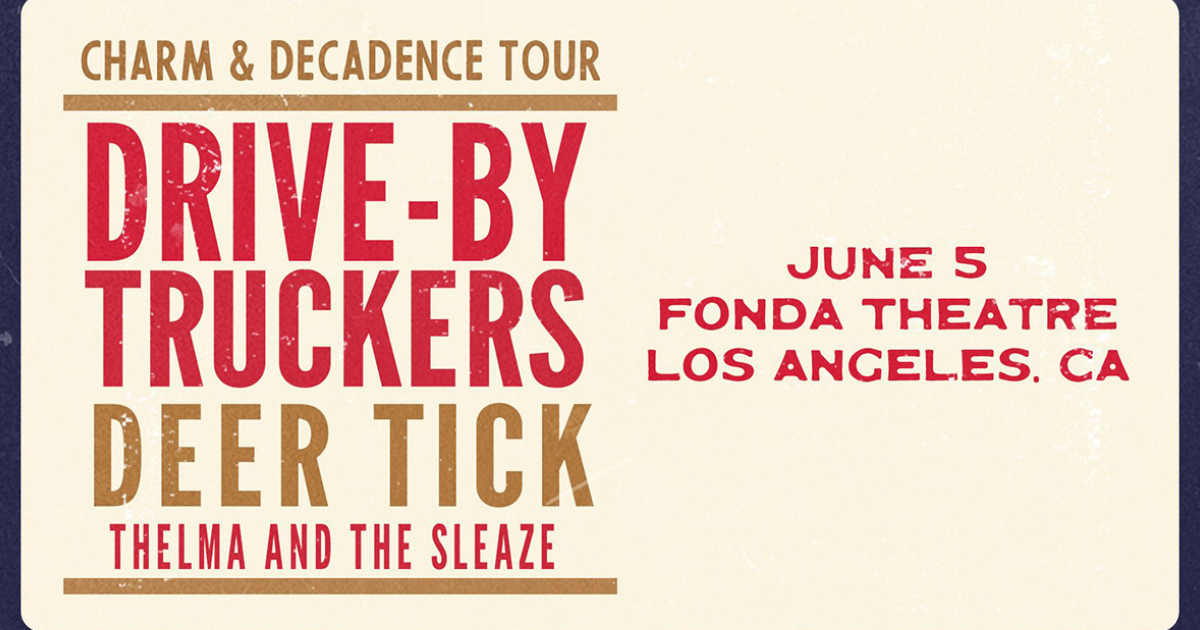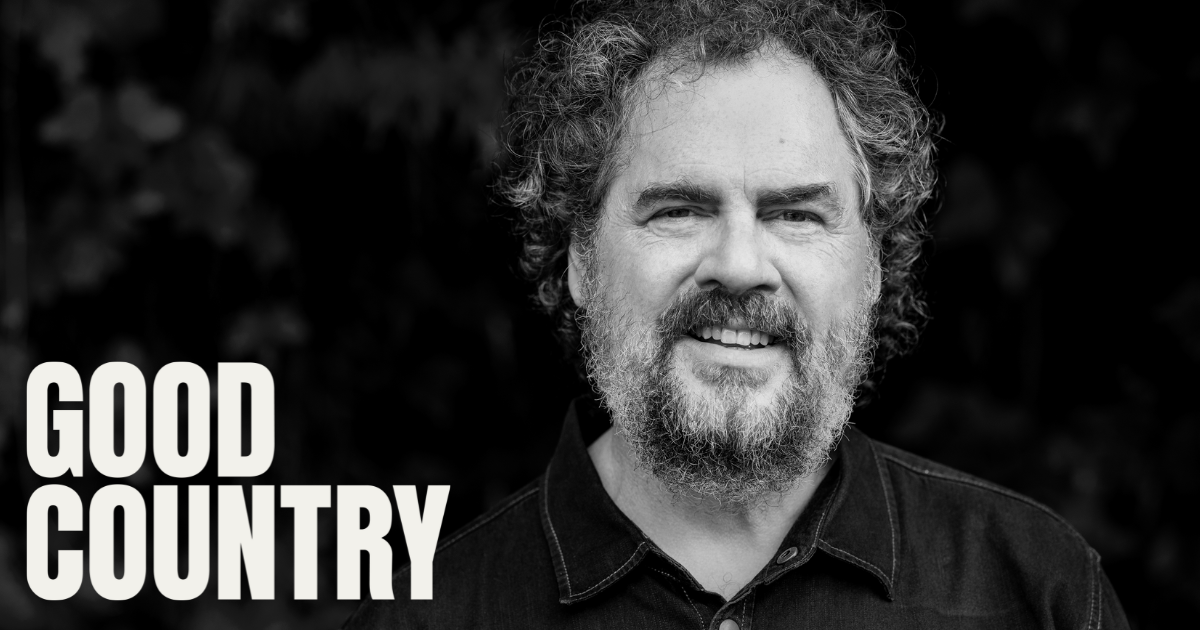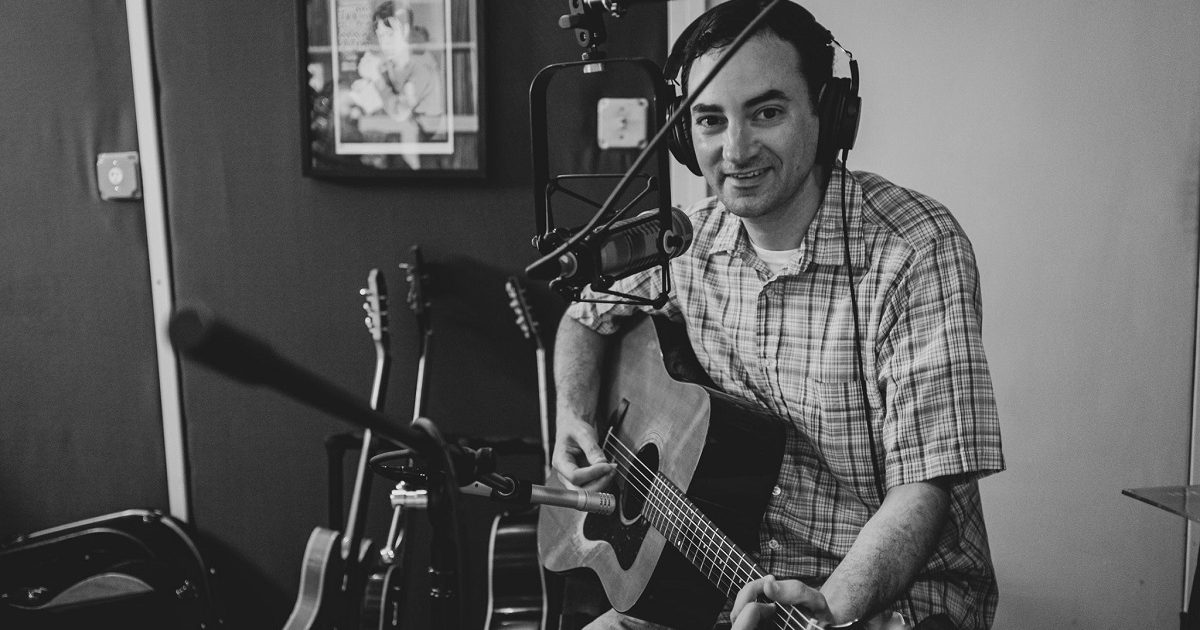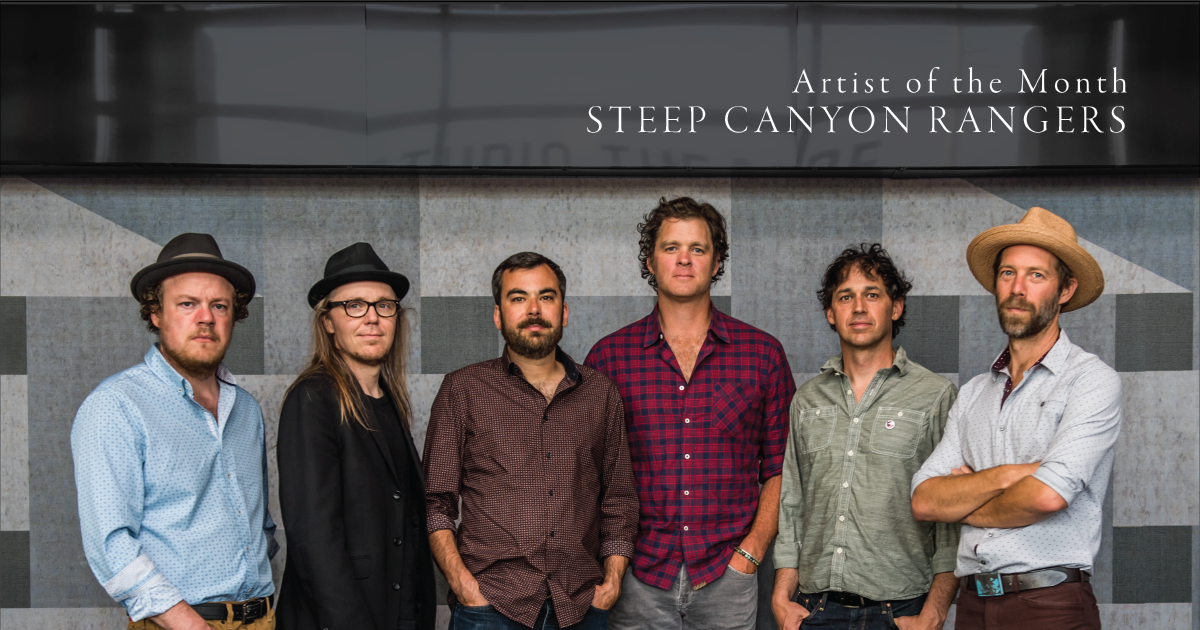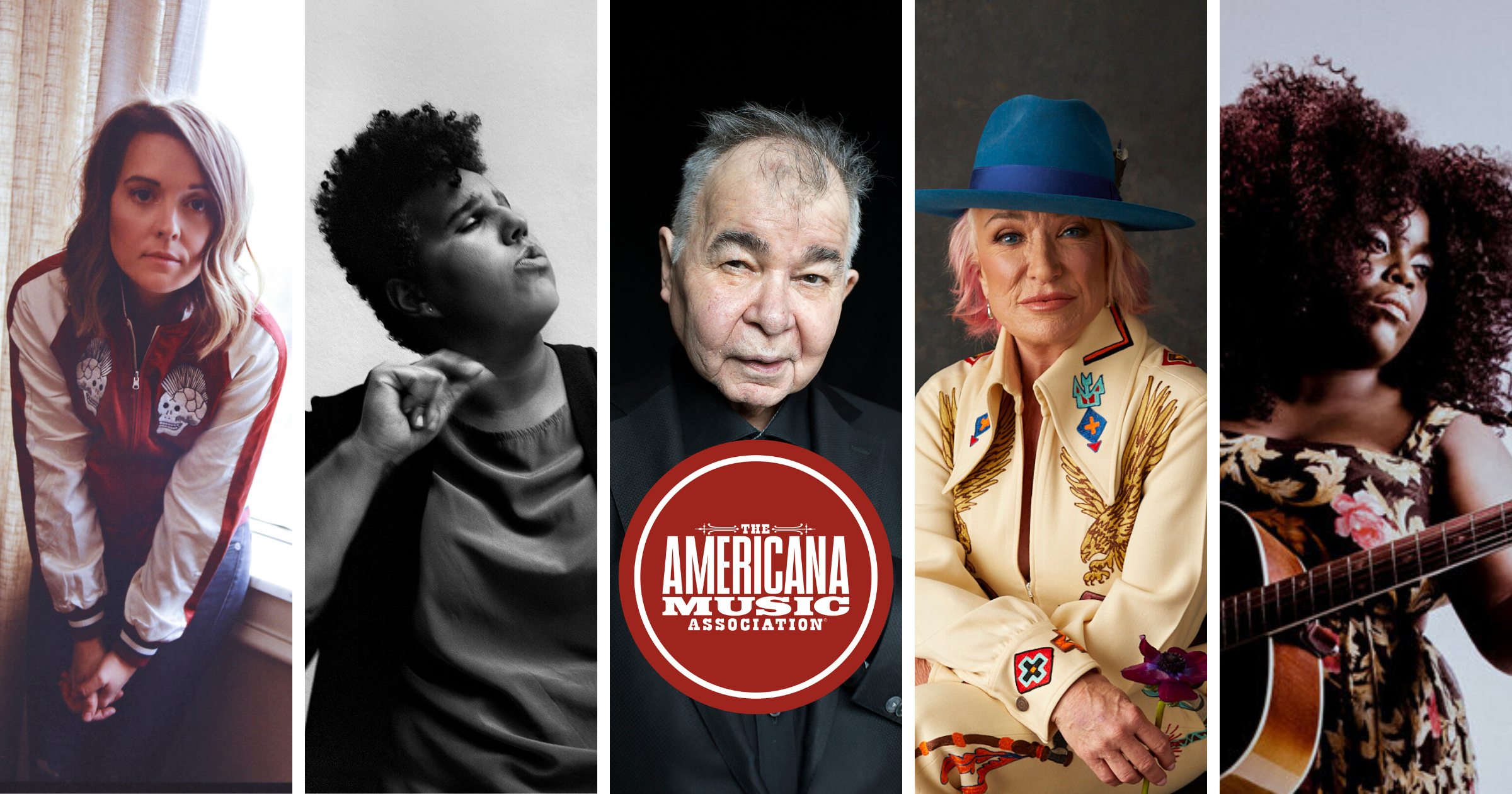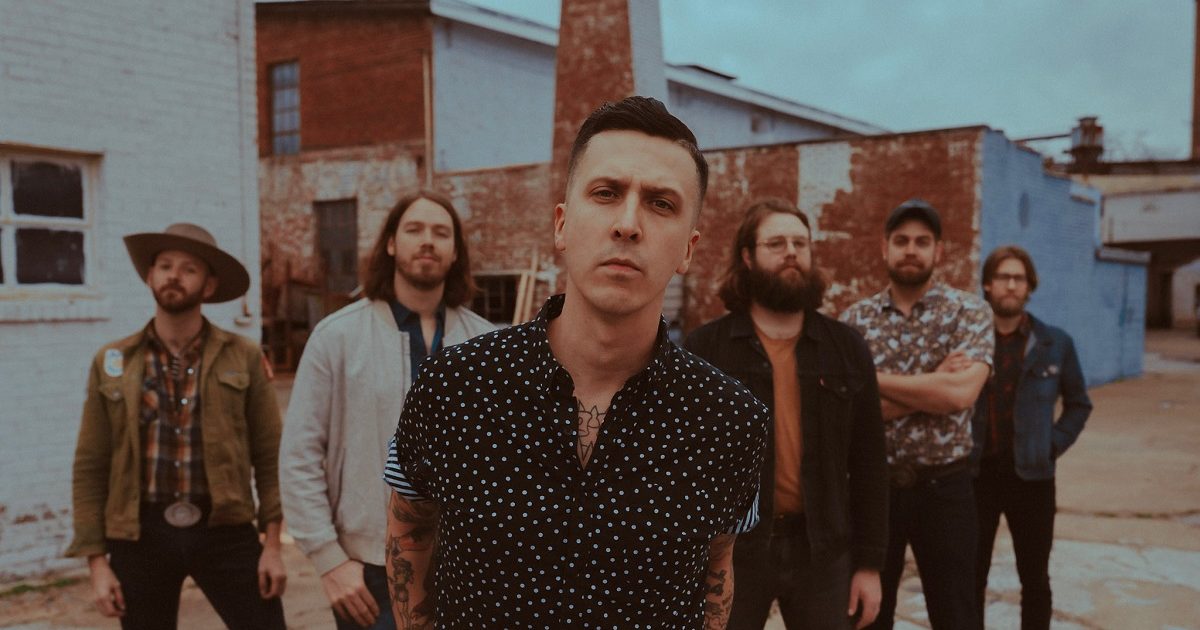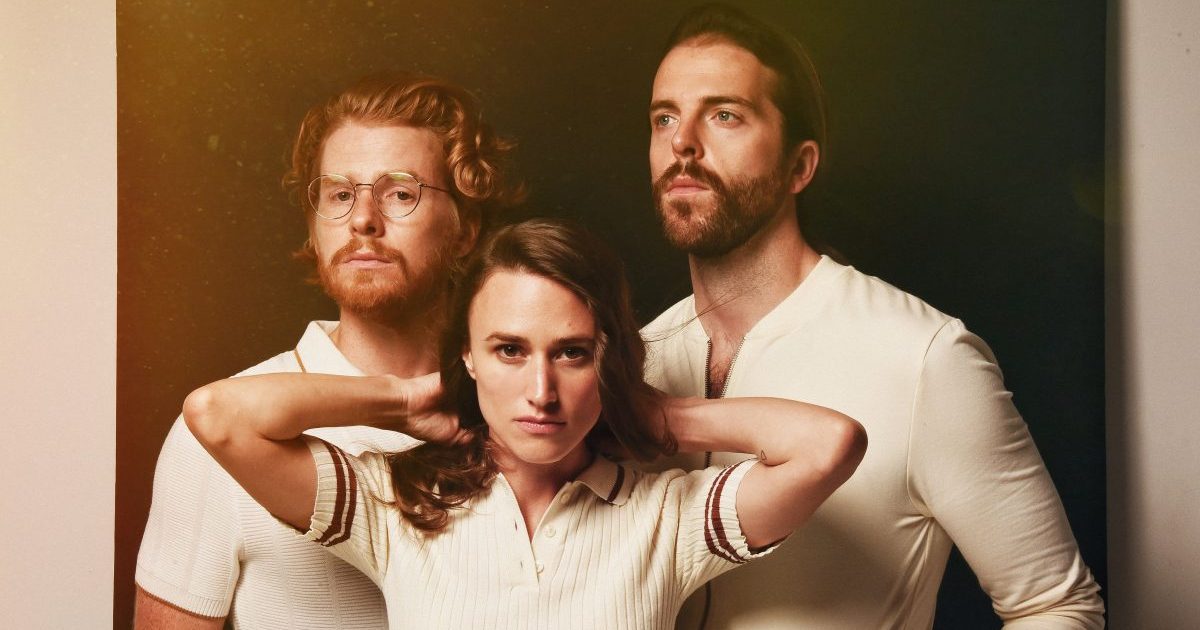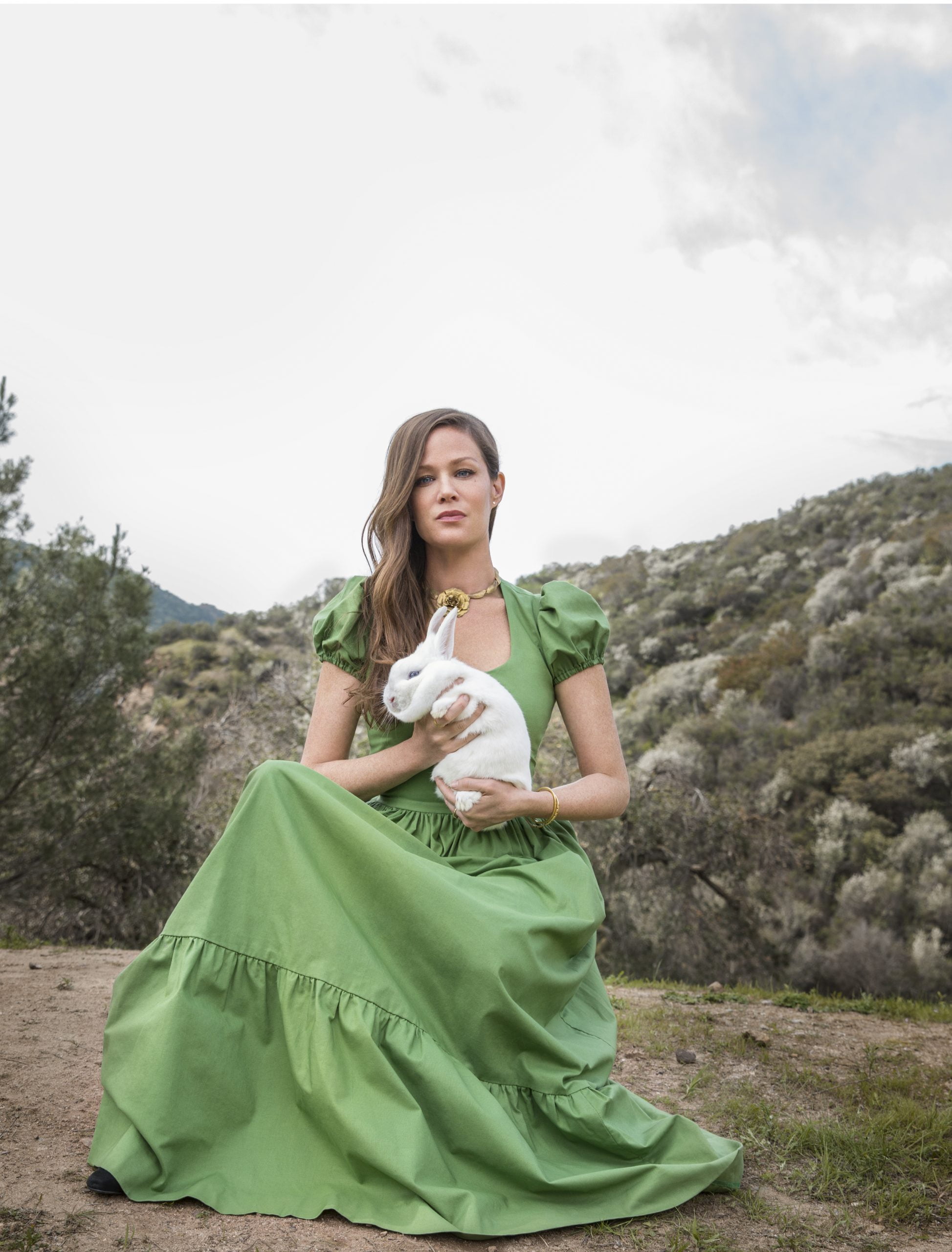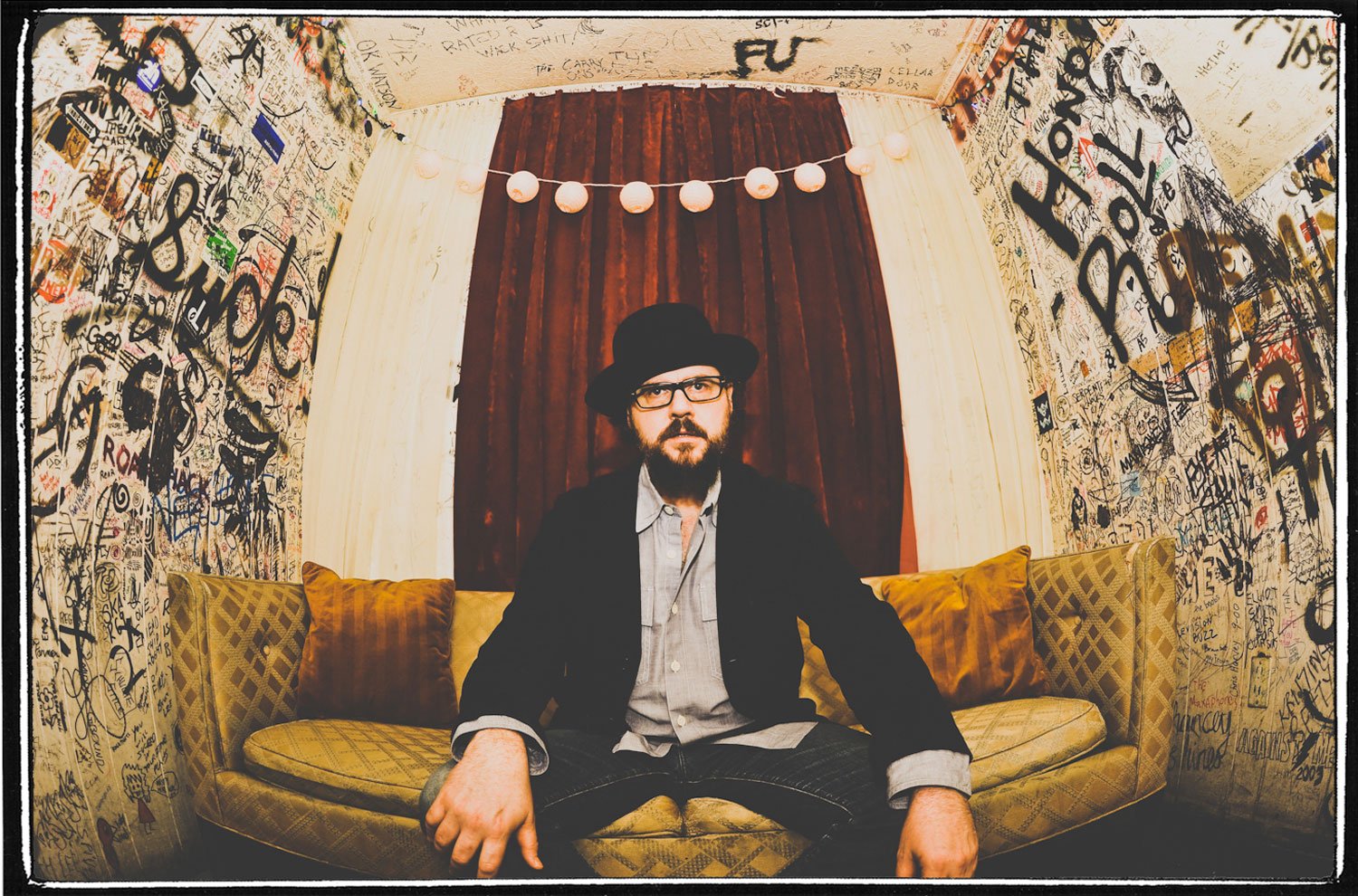Tag: drive-by truckers
Exploding Trees & Airplane Screams
Most people know Patterson Hood as the frontman (really one of two frontmen) for the long-running rock band Drive-By Truckers. Had they come up in the 1970s instead of the ‘90s, the Truckers would have been mentioned in the same breath as bands like Lynyrd Skynyrd and The Allman Brothers Band. Led by Hood and fellow singer-guitarist Mike Cooley, they play kickass Southern rock — but the caveat is that this is intelligent kickass Southern rock. And much of the band’s sensibility is informed by Hood’s unique youth. He grew up in Alabama, but was raised by liberal parents (his dad is legendary Muscle Shoals bassist David Hood). As Patterson says, “Dualities have always been an obsession of mine and to some extent [of] the band itself.”
Over the years, Hood has also kept a solo career going on the side. But his new album, Exploding Trees & Airplane Screams, is unique for a couple of reasons. For one thing, it’s his first solo record in 12 years. For another, it’s a somewhat different beast, musically, from most of his albums – both with and without the Truckers. There’s considerably less guitar-based rock and roll, and other instruments, such as piano and even woodwinds, have been pushed more to the fore.
This is still very much a Patterson Hood disc. You can’t miss his distinct, gravelly vocals. His storytelling – often stories of what it was like to come of age in 1970s Alabama – retains a sharp eye for detail and the aforementioned dualities. There’s a lot of pathos in Hood’s writing, but there’s always some humor as well. Exploding Trees features appearances from the Truckers’ Brad Morgan and Jay Gonzalez (on drums and keyboards, respectively), not to mention Lydia Loveless (on the heartbreaking “A Werewolf and a Girl”), Steve Berlin, and producer Chris Funk, among others.
Good Country recently had the pleasure of catching up with Patterson Hood.
You’ve been very prolific with the Truckers, but Exploding Trees & Airplane Screams is your first solo album in more than a decade. Why a solo album now?
Patterson Hood: That’s a great question. The reason, I guess, is that I’ve been super busy with the band. The Truckers have been in a really good place for over a decade now. So I wasn’t particularly eager to do a side project just for the sake of doin’ one.
But [with] every album, there’s always a couple of songs that somehow get lost in the shuffle. Particularly after the record comes out – they turn out to be great tracks on the record, but they never get played live. So they are kind of forgotten songs that I care a lot about. I kind of started a file some years back for those songs. It’s not that the band can’t play them; the band played the shit out of ‘em. [It’s] more just the way our shows are, the flow of the show, the rooms we play. You know, the emphasis live often gets put on a certain level of rock, for lack of a better way of puttin’ it. There are songs that might be a little more introverted. So I’ve had a stack of those songs that were sitting there.
And I also, about 10 years ago, became friends with [producer] Chris Funk. We would play together from time to time, usually in the Northwest, because we both live in Portland. We had this cool chemistry. So for a long time, we’ve been talking about making a record together. And during the lockdown – when I was stuck and couldn’t go anywhere or do anything – I spent a lotta time up in my music room. I wasn’t really able to write a lot during lockdown, because my brain was just not functioning very well. I was very depressed. It didn’t make for good songs. But I could go back and go through song fragments and hone in on things. I could really edit like crazy! So I spent a lotta time working on those songs – instead of thinking in terms of what I would do in a rock band format, what I would do in not a rock band format. You know, like “I could hear woodwinds on this song!” Things like that.
We cut it pretty quick. But I spent a long time working on it before we recorded it, you know? Including Funk telling me a few months before we went in, “I hope you’re practicing that piano, because I want you to play it on the record.” I’m like, “No, that wasn’t the plan. The plan was to have someone who can actually play the damn thing!” I’m thankful, because if he hadn’t kicked my ass, I probably wouldn’t have played piano, to be honest. It forced me out of my comfort zone, which I think was as much the point as anything for him. I think he wanted to keep me in a state of perpetual terror! [Laughs]
I had been wondering if that was you playing most of the piano, whether it was Jay Gonzalez or someone else?
I played a lot of it. I mean, I’m not playing all of it; Jay’s definitely playin’ on it. And I think Funk and I both play piano on one song. Funk played a lotta synthesizers. Jay’s playing some old vintage weirdo keyboards that have names that I can’t even remember. Phil Cook played that organ part on “The Forks of Cypress” too. But as far as the songs that seem to be built around a simple piano part – that tends to be me. That’s what I play: simple piano parts! [Laughs] I’m not Randy Newman.
Can I ask you about a few of the specific tracks? I understand that “Exploding Trees” was based on an actual event.
Yeah. It was kind of like a meteorological phenomenon, I guess. It was in my hometown in February of 1994. It was right before my 30th birthday [and] right before I moved to Athens, Georgia. The weather had been warm and it rained a lot for a couple of weeks. It just rained and rained, you know? Borderline flood conditions. There’s a lot of pine trees, particularly in my home area. And they all got completely waterlogged by all the rain and with the warm temperatures.
Then there was this sudden freeze; the temperature dropped like 40 degrees in a couple of hours. And all the water in those trees froze. Particularly those pine trees – I guess they splinter easier anyway. The trees basically exploded all over town, kind of at the same time. Thousands of fucking trees! I mean, flattening cars, buildings, people. It was really awful. … And I had been out of town. I had ironically visited Athens a couple of nights before for the very first time – which directly led to me living there shortly after. I was driving back home as it happened; I basically drove right into the middle of it. I was trying to get to my grandmother’s house to check on her. I got to the house and there were, like, pieces of trees that had gone through the roof. And I couldn’t find her anywhere. [It turns out] she was fine. She was at a neighbor’s house.
I love the line “beauty queens in hospital gowns.”
Right. Well, one of the worst injuries of this storm was a girl I knew. I worked at a restaurant with her. She had just won Miss UNA, the beauty pageant, and was like two weeks away from going to compete for Miss Alabama. Lovely, lovely young woman. Very sweet – super Christian. And an oak tree fell on her car, with her in it. And it knocked her head down into her body cavity. It completely pulverized her neck and back – but she lived! She’s a quadriplegic [now, but] that accident led to [that line].
Oh God. That’s awful.
It feels like there’s a theme on a few songs of reckoning – coming to terms with past events, maybe.
Sure. Or trying to make sense of things. “Miss Coldiron’s Oldsmobile” – I was too young when that was happening to really wrap my head around what all of that meant. But as an adult, you can go, “Okay. She was being gaslighted, you know?” Every time she would ask for money, she’d get reminded of the mental hospital she had spent some time in. Things like that. It was pretty fucking insidious.
“The Van Pelt Parties” – you know, that was some of my first experiences with drinking and how adults partied. I was a little kid, sneaking booze from the punchbowl. I was the only kid at the party and we would go every year. And the older I got, the drunker I got. And the grownups were too drunk to notice! [Laughs]
Was Van Pelt a part of Alabama?
They were a family. He was a college professor, she was a schoolteacher. Their daughter was a painter who had been my babysitter. And my parents were right in the middle of their ages – kind of ended up becoming friends with all of them, with the daughter and the parents. So they were a big presence in my life growing up. You know, I loved ‘em. Their daughter, who’d been my babysitter, taught me a lot of cool stuff. She turned me on to some cool music. I actually have a painting she made after tripping on acid at a Doobie Brothers concert!
Maybe it was because we were young, but I think the ’70s had a much cooler vibe than the present.
Well, about anything’s better than [now]. I hate saying this so bad because I’m not prone to romanticizing the past; I’ve always rebelled against glory days. But right now sucks! The level of fucking misinformation and just the insanity right now is so insidious. It’s hard right now not to feel a certain amount of nostalgia for any time in the past.
You and Mike Cooley have been playing together for almost 40 years or more. And other members of the Truckers have come and gone. But the drummer, Brad Morgan, has been with you guys forever and we don’t hear a lot about him. Tell me a little about Brad and what he brings to the band.
The band wouldn’t exist without Brad. Brad was the glue that kept all this crazy shit together all these years. You know, he’s that guy that’s really even-keeled. And he brought that to the table at times when the band was far too tumultuous and emotional for our own good. We call him Easy B. There’s a golden rule in the band and that’s “Don’t piss off Easy B!” Because if you’re fucking up enough to where Easy B gets mad at you, you are fucking up! And you don’t want the phone call from Easy B! He doesn’t get mad often so if he’s mad, there’s a good reason for it and you better take heed. He’s also a colossal drummer. He so often takes such a subtle approach to things that people don’t realize what a bad-ass drummer he is.
I know you have some solo dates lined up. What can people look forward to when you’re touring with this album? I assume it’ll be a little different than a Truckers show?
Yeah! Very different. But at the same time, it’s the same universe. [Lydia Loveless] is in the band that’s touring this record. She’s gonna open the show and she’s gonna play bass and sing harmonies in my band.
I think anyone who’s into the Truckers – if they can tolerate my voice, they’ll probably like this too. [Laughs] If you’re there for the big frontal assault and guitars and sweat and spit that comes with a Truckers show, it’s very different. Although I’m not ruling out those things happening, too. But it’s a quieter show. It’s gonna be built around these songs, with some other stuff that stylistically or thematically works with this. And it’s cool.
Photo Credit: Jason Thrasher
LISTEN: Adam Klein, “Halfway to Heaven”
Artist: Adam Klein
Hometown: Atlanta via Athens, Georgia
Song: “Halfway to Heaven”
Album: Little Tiger: Outtakes from Low Flyin’ Planes
Release Date: January 22, 2021
Label: Cowboy Angel Music
In Their Words: “’Halfway to Heaven’ was originally intended for inclusion on the Low Flyin’ Planes album, but wasn’t actually recorded during those sessions. It was always a key song for me from the collection, and a companion piece to the title track, which also premiered on The Bluegrass Situation. I figured we’d just put it on the opposite side of the record from the song ‘Low Flyin’ Planes,’ but there were such strong thematic strands connecting the two songs that it felt like it served the same purpose. So we decided to kick it down the road a bit, and it’s finally finding a home on this EP of outtakes from Low Flyin’ Planes.
“The track was recorded on a subsequent visit to Dial Back Sound studio and features producer and engineer Bronson Tew (who also mixed and mastered LFP and the outtakes EP) on acoustic and electric guitars, bass, drums, and harmony vocals, and Jay Gonzalez (Drive-By Truckers) on Wurlitzer. As usual, I sang and played acoustic guitar. And I want to highlight Bronson’s role in bringing my songs to life — our musical efforts are a real partnership, and producers like him, who build and shape the sonic landscape of songs and records, deserve more credit than they often receive. ‘Halfway to Heaven’ directly expresses the main themes and questions of Low Flyin’ Planes, as I sought balance between the precarious lifestyle of a touring musician and traveler, in general, and a more settled, domestic life with my then-girlfriend, now wife.” — Adam Klein
Photo credit: Jeff Shipman
With ‘Arm in Arm,’ Steep Canyon Rangers Give Everyone Time to Shine (Part 2 of 2)
Steep Canyon Rangers’ Arm in Arm, their first collection of all-new material in two years, is a set of highly grown-up songs, some with storylines that you’d expect from the likes of Drive-By Truckers or Bruce Springsteen. It’s more loose-limbed and less traditional than past Rangers albums, with fine ensemble playing throughout.
BGS caught up with co-leaders Woody Platt and Graham Sharp in separate conversations leading up to the release of Arm in Arm. After starting with Platt yesterday, here is the conversation with Sharp.
BGS: With the band off the road, have you been able to do any songwriting during this time?
Sharp: I started off writing on a real tear the first few months. But then I slacked off a bit, in part because that coincided with me starting to make an album of my own. Switching from writing to recording slowed down that end of it, but working on my own stuff is kind of out of necessity. For the band to survive this and come back when it’s time, we’ve all got to look out for ourselves a little more.
It’s a strange new hustle, but we’re holding up pretty good. We’ve all been forced to sort of pivot, after having not stopped moving in 20 years. This is the longest any of us have stayed put that whole time. It takes a moment to settle, but it’s been eye-opening. Forced me into some new directions that have been good and ought to pay dividends once we can get the band back together. I’m trying to pull out as many silver linings as I can.
I don’t know where or when it will ever come out, but the solo album is close to done. I’ve been working with Seth Kaufman from Floating Action in his little basement studio here in Black Mountain. It’s mostly new songs, and a handful of tunes the Rangers have been kicking around a while without getting to them. Nothing bluegrassy about it, mostly country to country-soul, because I have definite tendencies in that direction and a deep love for country music of the ’60s, ’70s, ’50s. That’s still among my favorites.
After Charles Humphreys III left the Rangers in 2017, this is the first album where you’ve written all the songs, not just most of them. Was there more pressure on you?
Not necessarily. It did not change my process much, anyway. I always just try to compile as much good material as I can. It is neat that with a band as organic as this one, a song can kick around for years where we’ll never find a place for it and then suddenly it’s revived. The last song on the album “Crystal Ship” was like that. I had that one for a long time and then backstage one day, [Mike] Ashworth just started playing that melody because he remembered it from a year or two earlier. It’s cool to have the band’s collective memory to draw on, where everybody is part of the process.
The first song “One Drop of Rain” is another. I probably wrote that one six or seven years ago and I’d just never taken the time to find the right groove and place for it. Then one night Woody and I were backstage, I had this little banjo roll, he had the phrasing to go with that and we put it together. A lot of songs come together over time like that. The process is more cumulative than me bringing something in, “Hey, I’ve got this new song.”
Probably “One Drop of Rain” and “Honey on My Tongue,” for different reasons. I can remember exactly where I was and the situation I was trying to capture with “One Drop,” just shortly after my father-in-law had died very unexpectedly — 64 years old. What it gets at for me is, try to love your way through the hardest situations. And “Honey” is one I wrote with my daughter in mind. She was giving me a hard time, saying I never write songs for her — not true! But yeah, okay, that was written specifically for her. There are several songs about resilience, dealing with loss, setbacks. All to different degrees, tied to different moments in time.
This record sounds very, dare I say it, mature and grown up.
Well, we’re all passing into the point in our lives where we see a lot of past decisions come to fruition as everyone’s lives play out, our own as well as others. That perspective figures into it. As a songwriter, I’m maturing and trying to hone in on the emotional center of a song – and trying not to write about fluff. We were all very aware while making this album that a lot of the songs aren’t necessarily sad, but a little bit heavier.
And on this record, you’ve also got the first lead vocal from new bassist Barrett Smith.
It’s been cool, having him take on a bigger vocal role. With Woody or myself, it’s just us singing songs at this point. But with Barrett, there’s this ability to tailor songs to a new voice in the band. The song he sings, “Everything You Know,” we talked through the lyrics and the story. Woody and I have always done that, gone through songs in detail. Although sometimes, I don’t necessarily want to influence the pictures anybody else sees in their head while singing.
Once a song is written and out there, it belongs as much to the listener as the singer or the writer. Sometimes they come up with something different, too. “Can’t Get Home” from the last record, Woody thought I wrote that for soldiers coming home and he wasn’t the only one. I had not necessarily meant it that way, but I talked to enough other people about it that it kind of changed the song’s meaning for me, which was cool.
I feel like what we do on stage is try to give everybody in the band moments to shine while keeping things moving. Producing this record ourselves was like that, more so than us playing while someone else producers. There are songs where I remember, so and so arranged this part, so and so suggested this harmony, so and so came up with the idea for this mix. So many different pieces where I can see everybody’s fingerprints. I’m proud of that.
I’m just psyched to have something to roll out into the world, reach out a little bit. You know, it’s not the best time to be releasing a record because we can’t tour. So I hope this will reach and touch people. I’m definitely prouder of this record than anything we’ve ever done.
Read part one of our Steep Canyon Rangers Artist of the Month interviews here.
Editor’s Note: David Menconi’s Step It Up and Go: The Story of North Carolina Popular Music, from Blind Boy Fuller and Doc Watson to Nina Simone and Superchunk will be published in October by University of North Carolina Press.
Photo credit: David Simchock
Americana Music Association Reveals 2020 Nominees, Expands Ballot
The Americana Music Association has revealed the nominees for its 19th annual Americana Honors & Awards, with Brandi Carlile, Brittany Howard, John Prine, Tanya Tucker, and Yola nominated for Artist of the Year. Nominees in the Duo/Group category are Black Pumas, Drive-By Truckers, The Highwomen, Buddy & Julie Miller, and Our Native Daughters. Nathaniel Rateliff and Aubrie Sellers received multiple nominations as well.
This year, the Americana Music Association expands its award categories to include five nominees instead of four, with the exception of Song of the Year, totaling six due to a nomination tie. The winners of each category will be announced during the Americana Honors & Awards on Wednesday, Sept. 16, 2020, at the Ryman Auditorium in Nashville.
However, a press release states that “the health and safety of the Americana music community is the association’s utmost concern, and the event organizers will continue to monitor the COVID-19 situation closely while following all national, state and local guidelines as they approach the scheduled ceremony date.” Ticketing information will be announced as plans unfold.
Here are the nominees for the 19th Annual Americana Honors & Awards
Artist of the Year:
Brandi Carlile
Brittany Howard
John Prine
Tanya Tucker
Yola
Duo/Group of the Year:
Black Pumas
Drive-By Truckers
The Highwomen
Buddy & Julie Miller
Our Native Daughters
Album of the Year:
And It’s Still Alright, Nathaniel Rateliff, produced by James Barone, Patrick Meese and Nathaniel Rateliff
Country Squire, Tyler Childers, produced by David Ferguson and Sturgill Simpson
The Highwomen, The Highwomen, produced by Dave Cobb
Jaime, Brittany Howard, produced by Brittany Howard
While I’m Livin’, Tanya Tucker, produced by Brandi Carlile and Shooter Jennings
Song of the Year:
“And It’s Still Alright,” Nathaniel Rateliff, written by Nathaniel Rateliff
“Bring My Flowers Now,” Tanya Tucker, written by Brandi Carlile, Phil Hanseroth, Tim Hanseroth and Tanya Tucker
“Crowded Table,” The Highwomen, written by Brandi Carlile, Natalie Hemby and Lori McKenna
“My Love Will Not Change,” Aubrie Sellers featuring Steve Earle, written by Billy Burnette and Shawn Camp
“Stay High,” Brittany Howard, written by Brittany Howard
“Thoughts and Prayers,” Drive-By Truckers, written by Patterson Hood
Emerging Act of the Year:
Black Pumas
Katie Pruitt
Aubrie Sellers
Billy Strings
Kelsey Waldon
Instrumentalist of the Year:
Ellen Angelico
Annie Clements
Brittany Haas
Zachariah Hickman
Rich Hinman
Photo credit: Brandi Carlile by Alysse Gafkjen; Brittany Howard by Danny Clinch; John Prine by Danny Clinch; Tanya Tucker by Danny Clinch; and Yola by Alysse Gafkjen.
AMA logo courtesy of the Americana Music Association.
BGS 5+5: American Aquarium
Artist: American Aquarium
Hometown: Raleigh, North Carolina
Latest album: Lamentations
Answers provided by BJ Barham
Which artist has influenced you the most … and how?
I can confidently say that I wouldn’t be the songwriter I am today if it weren’t for the discovery of Bruce Springsteen and his music in my early twenties. A friend played me Nebraska and I was floored. Must have listened to that album for a month straight. He was one of the first artists I have a clear memory of hearing and saying, “I want to do that.”
He writes these elaborate short stories set to music. The songs are expansive and cinematic. The characters are all people we know personally. Intimate snapshots into the lives of the working class. He speaks the universal language in a way not many people will ever be able to. There is something so simple, yet so complex about the way he tells stories. I don’t trust a songwriter who says they aren’t a fan of Springsteen.
What other art forms — literature, film, dance, painting, etc — inform your music?
I read a lot. I usually prefer fiction, but I’ll occasionally do a deep dive into a music-related autobiography. I tend to go for Southern writers and gravitate to the darker side of the genre. My songs take place in the darker corners of the Southern experience, so it doesn’t surprise me that my literary taste tend to go there as well. Faulkner, O’Connor, Harper Lee. The greats are what sucked me in.
I’ve been reading a lot of Cormac McCarthy, David Joy and Barry Hannah as of late. There is a familiarity of place that I really enjoy about them. I think a lot of the flaws in the characters of my songs are a direct result of the books I read in my leisure time. In my lifetime, literature has informed so much of what I know about people, I would be lying if I said it didn’t have an effect on me as a writer.
What was the first moment that you knew you wanted to be a musician?
The first time I played songs in front of people I was hooked. I was double majoring in political science and history at NC State University with every intention of going to law school after my undergraduate work. Then I fell in love with songs. I remember the first show like it was yesterday. Me and some friends from high school played (horribly) at Tate Street Coffee in Greensboro, North Carolina, in front of about 20 people. I was hooked. I became a student of every aspect of the trade. Songwriting. Performing. Business. There was no looking back after that first show. I had found my calling.
If you had to write a mission statement for your career, what would it be?
I played a lot of sports growing up and every time I would complain about a loss or another player just getting a “lucky” shot, my father always said that “luck was the product of hard work” and that is something that has always stuck with me. Work Hard. Get Lucky. It’s so simple, yet so profound. I have those words tattooed across my chest to remind me every morning that luck is not just something that happens to people. There’s a really great quote about luck being the intersection of hard work and opportunity. I think that was what my Dad was trying to say all those years ago, just a little less poetic.
When I started this band back in 2005, I knew I wasn’t the best writer. I knew I didn’t have the best voice. The one thing I did have control over was how hard I was willing to work. I truly believe that willingness to outwork anyone that was better than me is the only reason that I am where I am today. I get to earn a living from writing songs and playing them for people because I dedicated myself to the craft of songwriting and refused to take no for an answer. Some friends always say that I’m so lucky to be able to play music for a living. I just smile and silently thank my father for the lessons he instilled in me at such an early age.
How often do you hide behind a character in a song or use “you” when it’s actually “me”?
When I first started writing songs, they were extremely detailed and autobiographical accounts of my youth. The partying, the mistakes, the love lost. As I got older, I started moving more toward character based fictional narrative. Don’t get me wrong, there’s a little bit of myself in every single one of my characters. Some more than others. I believe it’s important to always add those dashes of personal experience into the songs. It makes them more believable to the listener and allows you to fall into those characters as you perform these songs every night.
The fiction is where you have the ability to make the songs universal and not just about you. The bigger picture versus the guy looking back at you in the mirror. I think part of the craft of songwriting is learning that balance. The greats came out of the gate with that gift. The rest of us had to learn it the hard way. It took me quite a few years to stop writing about the person that I currently am and start writing about the better versions of myself that I hope to become.
Photo Credit: Cal & Aly
10 Bands Returning with New Music in 2020
Roots music is already taking hold this decade, with ten notable bands preparing to release their newest albums in the months ahead. From award-winning bluegrass bands to prominent Americana ensembles, here are ten projects BGS believes are worth your attention.
The Ballroom Thieves, Unlovely (February 14)
This band’s undeniable energy has endeared them to crowds at Boston Calling, Newport Folk, Moon River, Mountain Jam, and Calgary Folk. However, folk music is just one part of their approach. The political messages are especially evident in Unlovely, while a new relationship between band members Callie Peters and Martin Earley informs the songwriting as well. Listen for Darlingside on the title track.
Della Mae, Headlight (January 17)
Prodigiously talented as instrumentalists and empowered by their mission of women’s rights, Della Mae make a statement on Headlight, especially in their support of those women whose claims of sexual abuse have been questioned. This time out, their sound is bolstered by keys, drums, and electric guitar. The trio of Jenni Lyn Gardner, Kimber Ludiker, and Celia Woodsmith will be touring in the U.K. this month.
Drive-By Truckers, The Unraveling (January 31)
The modern political climate informs Drive-By Truckers’ The Unraveling, with titles like “Armageddon’s Back in Town,” “Thoughts and Prayers” and “Babies in Cages.” Patterson Hood and Mike Cooley battled writer’s block for their first album in four years but it’s easy to figure out who ultimately inspired this set of songs, which were recorded in Memphis with producer David Barbe and engineer Matt Ross-Spang.
Dustbowl Revival, Is It You, Is It Me (January 31)
Dustbowl Revival decided to shake things up on Is It You, Is It Me. First of all, the Los Angeles-band wrote the songs in a two-week window in the studio, rather than fine-tuning them on the road. Second, the musical inspirations stretch further than usual, with pop vibes and percussion getting ample space. With Z. Lupetin and Liz Beebe on lead vocals, and produced by Sam Kassirer, this is one of the most exuberant records you’ll hear this year.
The Haden Triplets, The Family Songbook (January 24)
After an uncle discovered a songbook from the Haden Triplet’s grandfather, a radio star in the 1930s, the LA ensemble carried the material to the studio. The Family Songbook echoes that earlier era, while its covers range from the Carter Family to Kanye West. Their brother Josh Haden wrote “Every Time I Try.” A stunning musical blend comes naturally to the siblings, as their father was jazz bassist Charlie Haden.
The Lil Smokies, Tornillo (January 24)
While this roots band has origins in Montana, the Lil Smokies recorded Tornillo in a Texas town of that name – the site of Sonic Ranch Studio. While clearly influenced by bluegrass, the Lil Smokies capably transcend its borders. Their instrumental and vocal skills are evident in “Worlds on Fire,” yet bandleader Andy Dunnigan writes abstract lyrics that are just open-ended enough to put your own experiences inside.
The Lone Bellow, Half Moon Light (February 7)
Everything that has propelled The Lone Bellow into the hearts of live music fans is found in abundance within Half Moon Light. The passionate delivery, the poetic lyrics, the propulsive melodies – all accounted for. This time the trio teamed with The National’s Aaron Dessner, who produced the album at his studio in upstate New York. A three-month U.S. tour kicks off Feb. 12-13 at the Troubadour in Los Angeles.
The SteelDrivers, Bad for You (February 7)
The lonesome growl of the SteelDrivers is now delivered by Kelvin Damrell, a raspy singer and guitarist who makes his debut recorded appearance in the lineup on Bad for You. (No pressure, but their 2015 album won a Grammy for Best Bluegrass Album.) Founding member and fiddle player Tammy Rogers co-wrote 10 of the 11 new songs and sings harmony, too. Their spring tour launches February 6 in Bristol, Tennessee.
The Wood Brothers, Kingdom in My Mind (January 24)
Even when they’re writing about heavy topics, the Wood Brothers bring joy into their music. Kingdom in My Mind offers a mature perspective with a timeless groove, although the album came together by chance after building their own studio in Nashville. After listening back to some jam sessions, they discovered they could carve out some new tracks. Tunes like “Little Bit Sweet” capture that unmistakable magic.
Wood Belly, Man on the Radio (January 31)
A bright spot on Colorado’s bluegrass scene, Wood Belly worked with producer Sally Van Meter to further tap into their harmony-driven sound and arrangements. “Can’t Get Behind” (with special guest Jeremy Garrett) is about needing acceptance, although the band has found exceptional allies already with an IBMA Momentum Award nomination and a win in the 2018 Telluride Bluegrass Band Competition.
Photo of The Ballroom Thieves: Shervin Lainez
MIXTAPE: Allison Pierce’s Sweet Home Alabama
I love being from Alabama. I love that, no matter where I am in the world, people light up when I say that’s where I’m from. Apart from being a beautiful word, its history is rich and full and deeply tragic. Whether it is the power in the earth itself or what happened upon the earth there, it has given birth to many wonderful musicians, and I am very grateful to have shared the same air with these greats. — Allison Pierce
Hank Williams — “Move It on Over”
Hank has written so many good songs, it was hard to pick my favorite, but I have really great memories of dancing around the house with my sisters to this one. So “Move It on Over” wins the top spot.
Nat King Cole — “Stardust”
Nat King Cole, born in Montgomery, same birthplace as my mother, is one of my favorite singers of all time. His voice is smooth and effortless and full of quiet emotion, and what feels to me like love. “Stardust” is one of my favorite songs ever written, and Nat’s version falls into the top 10 favorite recordings in history for me. I consider it a great gift to humankind.
The Commodores — “Sail On”
I was a big Lionel Richie fan as a kid, and I was very aware that he was from Tuskegee, a town about 15 minutes from Auburn where I spent a large part of my childhood. Lionel, and other members of the Commodores, were frequent visitors to the health food store where my dad worked, and being within two degrees of separation from them was very exciting to my 7-year-old self. “Sail On” remains heartbreakingly hopeful to me to this day. It just doesn’t get old. Turn that shit up.
Emmylou Harris — “Easy from Now On”
Of all the wonderful artists from Alabama, I am most proud to share the same state and city of birth (Birmingham) with this magical woman. “Easy from Now On” is hands down my favorite and rips my heart open every time I hear it.
Allison Pierce — “Fool Him”
I hope no one minds that I include some of my own music in this playlist (one more to follow), but I am from Alabama so I consider it fair play (wink wink).
Drive-By Truckers — “Goddamn Lonely Love”
Well, this is just a great song, y’all. And nobody can deny it.
The Pierces — “It Will Not Be Forgotten”
I was in this band with my sister for 18 years, though we have been singing together for longer than that. I remember the first time we harmonized together in our living room in Birmingham when I was six and Catherine was four. From the very beginning, it became an important part of our lives. Singing with my sister has guided and shaped my life in countless ways and, as challenging as it sometimes was working that closely with a sibling, I am eternally grateful for the experience.
Candi Staton — “Young Hearts Run Free”
What a voice and what a song. Thank you, Miss Staton.
Dinah Washington — “What a Diff’rence a Day Made”
I have enjoyed Dinah’s voice and songs for years, but I’ve gotta be honest, I only just discovered she was from Alabama and I’m very happy to add her to the list!
Jimmy Buffett — “Why Don’t We Get Drunk and Screw”
You know, Jimmy, it’s a really great question. Why don’t we?
Lionel Richie — “All Night Long”
I’m not going to pretend that I did not dance around my room to this as a child using a hairbrush as a mic.
Catherine Pierce — “You Belong To Me”
Maybe I am biased, but I think that my sister is one of the best songwriters to come out of Alabama. And I know that my mother agrees, so it must be true.
ANNOUNCING: 2017 Americana Music Awards Nominations
Today, the nominees for the 16th annual Americana Music Association‘s Honors & Awards show were announced during an event at the Country Music Hall of Fame and Museum hosted by the Milk Carton Kids and featuring performances by Jason Isbell, Jerry Douglas, Patterson Hood and Mike Cooley of the Drive-By Truckers, and Caitlin Canty. The winners will be announced during the Americana Honors & Awards show on September 13, 2017 at the Ryman Auditorium in Nashville, Tennessee.
Album of the Year:
American Band, Drive-By Truckers, Produced by David Barbe
Close Ties, Rodney Crowell, Produced by Kim Buie and Jordan Lehning
Freedom Highway, Rhiannon Giddens, Produced David Bither, Rhiannon Giddens and Dirk Powell
The Navigator, Hurray for the Riff Raff, Produced by Paul Butler
A Sailor’s Guide to Earth, Sturgill Simpson, Produced by Sturgill Simpson
Artist of the Year:
Jason Isbell
John Prine
Lori McKenna
Margo Price
Sturgill Simpson
Duo/Group of the Year:
Billy Bragg & Joe Henry
Drive-By Truckers
Marty Stuart & His Fabulous Superlatives
The Lumineers
Emerging Artist of the Year:
Aaron Lee Tasjan
Amanda Shires
Brent Cobb
Sam Outlaw
Song of the Year:
“All Around You,” Sturgill Simpson, Written by Sturgill Simpson
“It Ain’t Over Yet,” Rodney Crowell (featuring Rosanne Cash & John Paul White), Written by Rodney Crowell
“To Be Without You,” Ryan Adams, Written by Ryan Adams
“Wreck You,” Lori McKenna, Written by Lori McKenna and Felix McTeigue
Instrumentalist of the Year:
Spencer Cullum, Jr.
Jen Gunderman
Courtney Hartman
Charlie Sexton
Patterson Hood on Music, Moving Around, and Making Peace with Southern Heritage
Patterson Hood was just eight years old when he wrote his first song and was a youthful 14 years old when he joined his first band. At 21, he teamed up with fellow singer/songwriter/guitarist Mike Cooley to form the Drive-By Truckers. Over the course of their 20 years on the road and in the studio, DBT have drawn on influences as diverse as Willie Nelson, Muscle Shoals R&B, and Led Zeppelin to make music that revives and redefines the words “Southern Rock.”
Now living in the sunny climes of Portland, OR, Hood talks about everything from growing up the son of a musical legend [Muscle Shoals session man David Hood] to race relations in the American South to DBT’s voluptuous new live album, It’s Great to Be Alive!
The first question I was going to ask is: What’s a boy from the Shoals of Alabama doing in Portland?
Well, my wife and I have lived our whole lives in two states. I’ve traveled — a lot — 15 years now, really heavy on the road. And we’ve always said we wanted to experience living somewhere else. We also wanted to live in a city. Athens, GA, is lovely. It’s one of my favorite places on earth. It’s a great town, but it’s a town. It’s a college town, so there’s a lot more art and cool stuff than most Southern towns with 100,000 people in it. But there’s also the downside of the college town thing, too, which after about 20 years, we needed a break from.
We both kind of kept a list and I’ve spent a lot of time in a lot of towns. Portland’s been on the top of my list since at least 2000. And, likewise, top of her list, too. We didn’t want to move our kids across the the country when they’re teenagers; we had a little bit of time, but it was running out. So we decided to do it. We thought of places that were closer to home, but this was our first choice. We said, “If we’re going to go through the trouble of moving, let’s go to our first choice, and let’s experience living in a different part of the country.” Kind of a different part of the world, honestly.
[“And a blue state,” comments Patterson’s wife, Rebecca, from the living room.]
And a blue state, yep. That certainly factored in.
We’ve loved it here. It’s a long way from home. We’ve both gone through some homesickness, for sure. Especially her and the kids, because I’m kind of used to being homesick. It’s kind of part of my existence, because I’m gone 100 days a year. But I think it’s worth it. It’s a beautiful, beautiful city, and it’s kind of nice just having the new adventure. I mean, my job is an adventure, to a big extent, but it’s kind of fun having this personal adventure, at this point.
One of the things I wanted to talk with you about is the controversy over the Confederate flag. I'm going to read a quote from an essay you wrote for the New York Times Magazine back in July and ask you to illuminate it a little: "If we want to truly honor our Southern forefathers, we should do it by moving on from the symbols and prejudices of their time, and building on the diversity, the art, and the literary traditions we've inherited from them."
Damn, did I say all that?
You said all that!
That's pretty good! [Laughs]
Yeah, that's definitely how I feel. There are a lot of beautiful, wonderful things about the South and then there's this albatross we've put around our own necks down there, based on our history and a really dark part of our country's history. It seems like there's so much else to be proud of than your great-great-grandad fighting in the war they lost, you know? It seems like we're selling ourselves short when we hang onto that as our tradition, because there are a lot of traditions. Today [on the day of the interview] is William Faulkner's birthday. Put him on a flag and you can wave that flag anywhere you want to. I won't object to it. Or whoever, you know? Harper Lee. There are so many great writers. Or Booker T. Jones.
Put Booker T. on the flag!
Or Helen Keller — she's from one of my hometowns. She's from the Shoals area. There's no shortage of people and things to be proud of in the South. Rock 'n' roll came from the South. That's a pretty big one.
White man's country and black man's blues meeting at a crossroads …
Yeah, totally. It's one of the great art forms of our time and hopefully will continue to be.
We were actually on our drive cross country, on our way here, when the Charleston thing happened. We were checking into a hotel in Denver and I saw it on the TV. I was like, “Get the kids in the room, away from the TV. Don't turn the TV on.” And then I sneak downstairs to watch it because I wanted to know what the hell was going on. And I could tell it was something terrible.
If someone wants to have the Confederate flag in their yard or on their car, I don't give a shit — that's their choice. No one’s taking their flag away. But it should not be ceremoniously displayed on the courthouse or the capitol grounds. That's something that all our citizens pay taxes to support and there's a huge percentage of our citizenry down there that's rightfully very offended by that. And it's very much a "fuck you" in their face. I don't think our government should be in the business of saying "fuck you" to a vast swath of our citizenry. So that was where I was coming from on that. I think I worded it better. [Laughs]
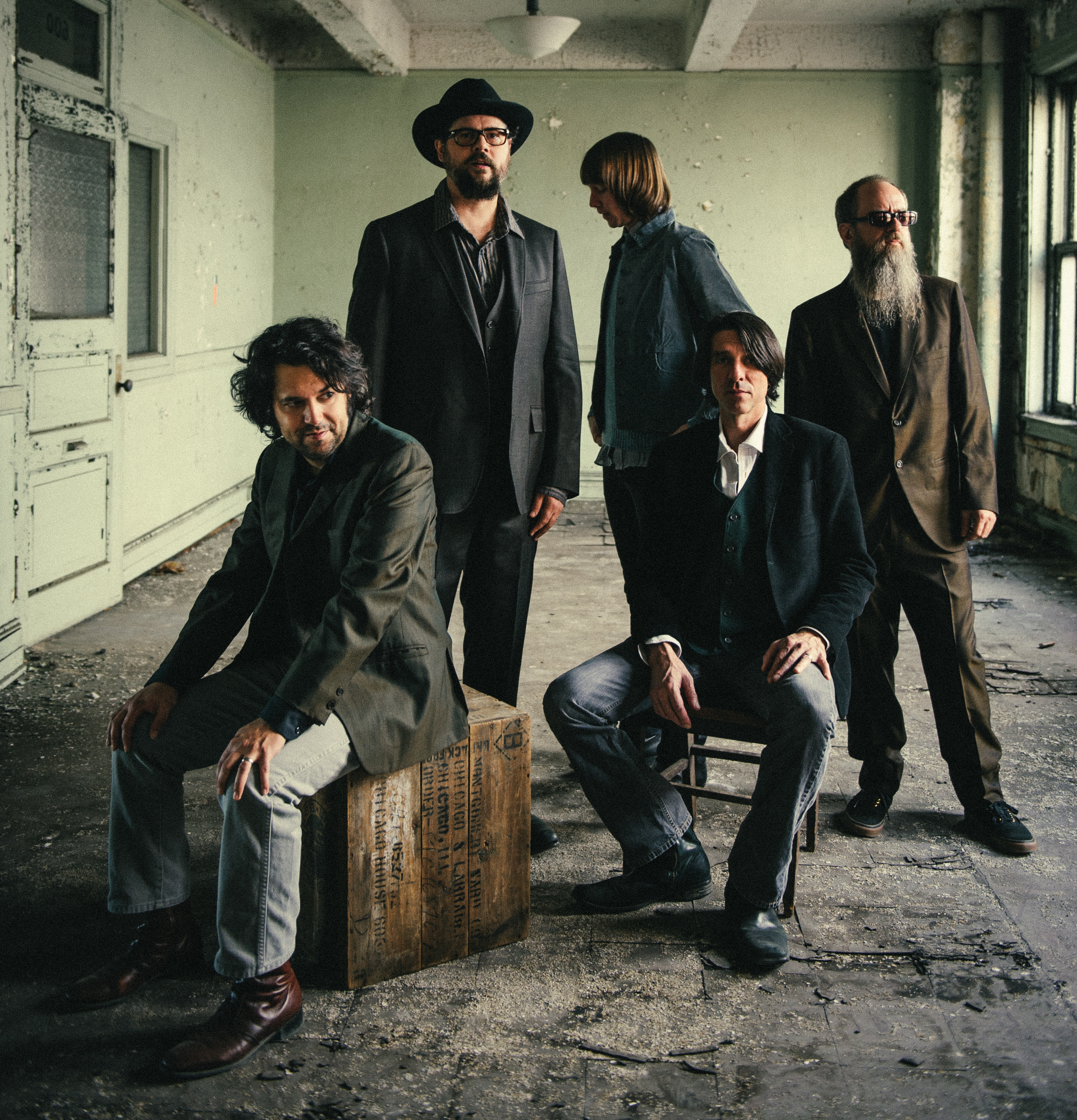
[Laughs] At one point in that same article, you talked about how, when you were young, you weren’t aware of what was happening in Selma or Birmingham or Montgomery. At the same time, you were witnessing what was, in my opinion, one of the great moments of integration in our history — when your dad and the Muscle Shoals Swampers were making records with some of history’s greatest black musicians, like Aretha Franklin.
I absolutely agree! It's one of the things I'm proudest of in the world. I can't fathom that it was my dad who did this really amazing, great thing during this really dark, horrible time. He's forever proud to have been there, too.
The Shoals is a weird area; it's a very conservative town. There's no shortage of people with all kinds of antiquated and unsavory viewpoints. But it wasn't the definitive notion of the town. I started first grade a couple years after the schools were integrated and I don't remember any big deal about it. There were black kids in my classroom and it wasn't a big deal. It wasn't like Birmingham.
The things that dad and they were doing … no one knew about that, either. That was a secret. It was like this underground thing happening that I kind of learned early not to talk about at school. I think most of the people in that town had no idea that any of that was going on until years later. There were probably some people who really started finding out when they made that movie a few years back.
It's a very, very different place now from when I grew up. When I go home now, it looks similar in some ways — buildings and stuff — but they're very proud of dad and the Swampers. They've got statues of them now. They're in the process of putting statues up of the musicians in different places in the town; it's kind of a new thing. They're very much honored and revered there now.
But, at the time, they weren't going to take any chances. They couldn't afford to be harassed and bothered. It was a dry county, you know, and musicians drink. They had to have liquor in the studio that had to come from the Tennessee state line or a bootlegger somehow. Not to mention other things that happened at recording studios … especially when the Stones came to town. [Laughs] It's a crazy, crazy story. The movie is a wonderful thing, but it honestly just scraped the surface, because there are so many facets to that story. People are starting to write books about it. There are probably several books worth of stories floating around.
I want to take a little detour from my list of questions. I’m looking over at your bookshelf and seeing Songwriters on Songwriting. Open it up and see where it lands.
Oh, Lord. I opened it to Todd Rundgren.
Todd Rundgren to the Drive-By Truckers … how do we make that connection?
It's crazy to open it right to that, ‘cause I always say that Something/Anything? is, like, my one desert island record. It has been since I was 12. I started writing when I was eight. Listening to that record was kind of a turning point in my writing. He's a madman. [Laughs]
That record had everything.
It did, and I loved that. Every side was a totally different genre.
It had hits; it had scream rock.
That's probably as much of an influence as anything. My taste is really, really eclectic. Our band may have a definite sound due to the way that I sing, or [Mike] Cooley sings, or just the way we play together, or whatever, even with all the different personnel changes through the years. There's a common thread, but if you look at the direction that thread is pointing at any given time, you get a lot of diversity. Our first two records were attempting to funnel this thing we do through the lens of old-time country. The third record, the live record, was kind of a punk rock record. Then the fourth record was Southern Rock Opera, which was this whole take on arena rock, set in the '70s, and trying to sound as '70s as we could. I think we kind of pulled that off, and that's probably not a stretch for us in retrospect. And then Decoration Day was this, and Dirty South was that.
Dirty South was us trying to take on some of the subject matter of the hip hop records of the day, filtered through the sound of the way we were and the way we played. We obviously couldn't rap, you know, so we didn't try that, but as far as the themes of the songs … we were all really into that. Blessing and a Curse was sort of our take on the post-punk Replacements era. Brighter Than Creation's Dark is sort of an Americana record, I guess. Big To-Do is an attempt at doing power pop. Go-Go Boots was country soul. I don't know what English Oceans was. We just wanted to make a record. [Laughs]
Which is what I really like!
We just wanted to make another Drive-By Truckers record, I think, without any kind of a genre idea. I think we felt like we'd done too much of that by that time. But I'm sure part of that influence was Todd Rundgren and Neil Young, too, ‘cause he's all over the map. A lot of the artists I love tend to go all over the map.
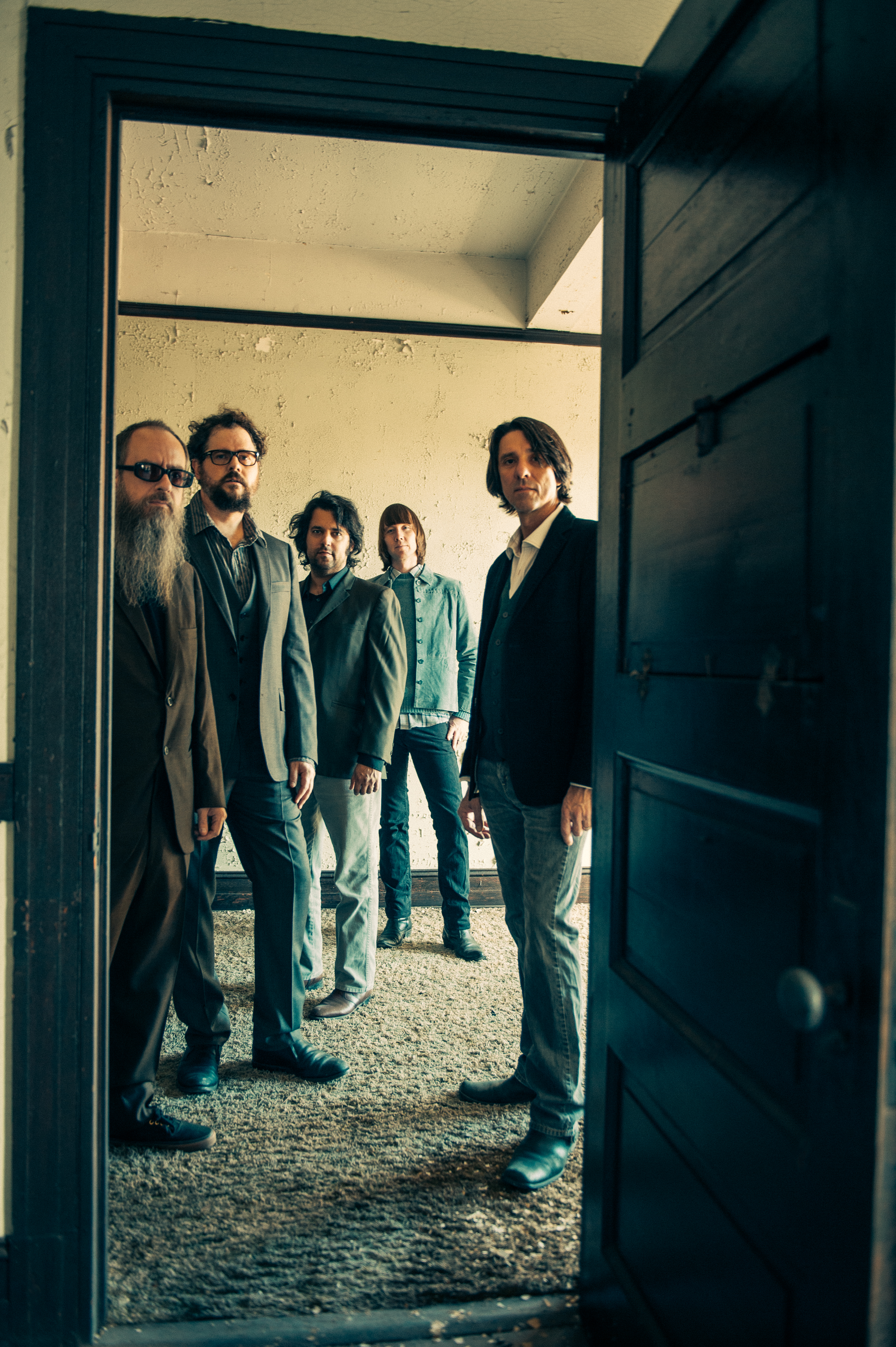
So, this is a good lead-in to the next question. You've got this new live record that came out recently called It's Great to Be Alive! There are 35 songs in the set. How do you choose what songs to put in there and how do you tie all these diverse influences together?
This line-up of the band is so great. I'm proud of all the different line-ups of the band. I love the various places the band was in, even if some of them had some issues or had some things that didn't work. But we've kind of landed on our ultimate band at this point. And Cooley and I both feel the same way about that. The way it plays together, the way it interacts, the personal dynamic, is all really fantastic.
We had made English Oceans, which is very much kind of the first time we went in with that line-up. The goal then was that we wanted to record it really quick and really immediate — we wanted to go in and just capture the moment. Everyone had a working knowledge of what the songs were. We all sent demos. In the case of my songs, they were literally just me on acoustic guitar. Cooley's demos were a little more done. I think he has fun doing that, building tracks. We just wanted to capture this band attacking that material. We'd been saying for years we wanted to do a live record. And it just seemed like now is the time. We had the band right, everybody's having fun, and if we were going to do a live record, I wanted everyone to be having fun, because that's part of the joy of the better live records. There's an aspect of fun to them.
As far as the song selection, we have 150 songs, at this point, in our history. We all had in our head, I think, what was most important for it to be. We don't use a set list, so that provided a challenge. We knew we were recording for three nights at the Fillmore. We didn't want to go through a set list and have it be different than a regular show, where we're having to follow a list. We still like to do it where we decide the first song as we're walking on, and then it just happens.
So our compromise was that we did a master list of maybe 20 songs that we wanted to make sure we captured over the course of the weekend. If on Thursday night we knew we had great takes on three of those, we'd mark them off the list. By Saturday, it was a pretty small list we knew we had to hit at some point during the show. It worked like a charm. We ended up with about 50 songs to choose from that had really great takes from over the course of the weekend. Then it's a matter of just whittling it down to a more usable group … well, if you can call 35 songs usable. I wanted it to touch fairly equally on the different eras and records of the band. There's a fairly even number of songs from the various incarnations of the band and records.
Why the Fillmore as opposed to some place closer to home, so to speak?
Well, we've always done really great on the West Coast. That's kind of a myth about our band. The South was actually a little bit of a later place for us to break. Historically, when we started out, the first towns we really had followings were Atlanta, Richmond, New York, and Baltimore. Chicago came pretty early, Austin came pretty early, and then we expanded out. But it took us a few years to get our touring up to the point where we could afford to make the trek cross-country and get out here, but we always did well on the West Coast once we started doing it.
When we put out Southern Rock Opera and all of a sudden got real management — someone besides me booking the band — our benchmark for being able to tell where we were at was the Fillmore. We were interviewing booking agents and we had narrowed it down to two. We point blank said, "We want to play the Fillmore. How long will it be before we can play the Fillmore?" One of the two people we were interviewing told us that we were being a little overly ambitious and we should think smaller. The other one told us, "I'll have you there opening in a year, headlining in three." He got the job. And he's still our booking agent — he's been with us since 2002, and will be with us as long we are together, as long as there's a band. He made those benchmarks. We played there about seven months later and we made the headline a couple months shy of three years.
Last year, we played three nights there. It was the end of our touring year. It just kind of made sense, like it was meant to be. I knew it would be a great room to record us in. It's a great-sounding room. It's not too big. If you get too big a room to record a live record in, you get that boominess. The acoustics are great, and also they don't have a barricade between the front row and the stage. The crowd is right up in your face. And we always play better in those rooms. They're rare. All my favorite places we play are like that. Our next choice after the Fillmore probably would have been the 9:30 Club, because it's the same thing. It's a similar-sized room. It's a room with a great history, but we played there at the beginning of the tour, and we played the Fillmore at the end of the tour, so it made sense for it to be there.
Is there one song on the record that, when you listened to it or when you were putting together the album, you felt was transcendent or a defining moment?
As far as my songs go, "World of Hurt." That's a song that always felt like one of the more special songs I've ever written. I was proud of the version on the record when we made Blessing and a Curse, but that night, I knew that night it was a good one — it was special. We had the horns and it was a really, really good take of it. I knew on stage we had gotten it, unless there was some kind of technical problem. Having David, our engineer, out there, you knew there wouldn't be any issues. That would have sucked — this great three-night stand and you listen to the tapes and it's all mangled. But it happens!
One more question I think ties up the whole conversation. Prior to playing "Made Up English Oceans,” Cooley talked about Jimmy Carter and the KKK coming to your hometown. He said it was a source of embarrassment for the home city. How do you see that conversation — in what you've said, in what you've written for the Times, in your music, in what he said there continuing for Drive-By Truckers as you move forward?
I think it's something that's definitely on all our minds. I'm curious to see, moving forward, exactly where the next record goes. We're actually pretty close to starting another record. I've been writing a lot for it; Cooley's writing a lot for it.
I think the general mindset is definitely a part of what we're writing, it's kind of where we are as a country. We're not going to get past any of this shit until we can talk about it. It's an uncomfortable conversation, so I understand why people shy away from wanting to talk about our country's history with race. And, you know, we're these white dudes from the South talking about it … but whites dudes from the South need to talk about it. It doesn't just need to be black people saying black lives matter. It needs to be something that we all can talk about and move forward from or else we're going to not move forward.
I was certainly one of those people that, when Obama was elected, thought, "Oh man, we have turned a corner!" I still idealistically hang on to some of that, but actually there's a lot of work left to do. I think it was probably overly idealistic to think that that was going to be the beginning of the end of that conversation. It was just the beginning of the beginning of that conversation, you know?
Patterson Hood photo by Andy Tennille. DBT photos by David McClister.
